24 Hours Hotline: +86 137-3541-1378
Email:beijing@tripstoshanghai.com
24 Hours Hotline: +86 137-3541-1378
Email:beijing@tripstoshanghai.com
Beijing, a city where ancient history and modern vitality intersect, is a paradise for food lovers. Beyond the Great Wall, the Forbidden City, and the sprawling hutongs, the food in Beijing offers a diverse and multifaceted experience that is deeply tied to the city’s rich culture and heritage. From centuries-old recipes that have been passed down through generations to cutting-edge culinary concepts reshaping the dining scene, Beijing’s food culture is a dynamic blend of the old and new. This guide delves deeper into the flavors, traditions, and modern innovations that define Beijing's gastronomic identity, ensuring that every bite you take reveals the soul of the city.
Peking Duck: A Timeless Symbol of Beijing’s Culinary Heritage
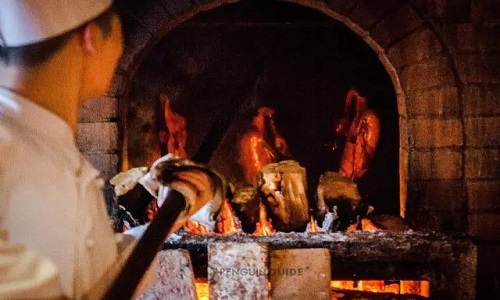
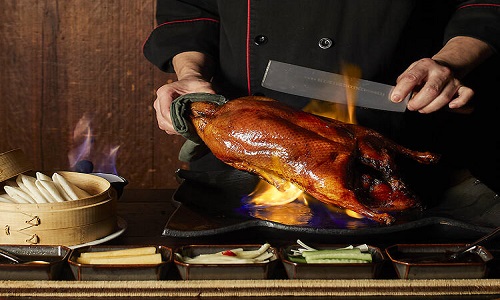
1. The Art of Peking Duck – History in Every Bite
Peking Duck is not just a meal, but an experience that’s centuries in the making. Its history dates back to the Ming Dynasty when it was a delicacy enjoyed by emperors. The process of preparing the duck—air-drying the skin, roasting it to perfection, and serving it with thin pancakes and condiments—has been perfected over hundreds of years.
Symbolism: Peking Duck represents Beijing’s royal past, showcasing a culinary tradition that has stood the test of time. The use of a wood-fired oven for roasting is a key factor in producing the signature crispy skin and tender meat.
Modern vs Traditional Preparation: While traditional methods maintain authenticity, modern establishments like Da Dong focus on making the dish lighter and less greasy, offering a more contemporary approach that still retains the dish’s rich flavor profile.
2. Best Places to Experience Peking Duck
Quanjude: The Legacy of Perfect Peking Duck
Looking to dive into Beijing's culinary history?
Quanjude, founded in 1864, is your go-to spot for an unforgettable Peking Duck experience. This iconic restaurant has been perfecting the art of roasting duck for generations, and their signature method of hanging ducks in the oven guarantees a level of crispiness you won’t find anywhere else.
Why go?
Quanjude isn’t just about eating—it’s about stepping into a piece of history. Picture this: the rich aroma of roasting duck fills the air, the crackling skin as the chef expertly slices through the bird. Each bite combines tender meat with a crispy finish that’s pure perfection. Whether you’re a first-timer or a regular, Quanjude’s traditional setting and expertly crafted duck are always a win.
Address: 32 Qianmen Street, Chongwen District, Beijing
Phone: +86 10 6302 2939
Da Dong: Peking Duck with a Modern Twist
Want to try Peking Duck, but in a more modern, health-conscious way? Da Dong is the place to be. Known for serving a version with thinner skin and less oil, Da Dong offers a lighter, crispier take on this classic dish without losing any of the flavor. It’s perfect if you love the dish but prefer a less greasy experience.
Why go?
At Da Dong, you’ll find the same rich flavors, but the texture is refined—light and crisp, with none of that heavy after-feel. Plus, the sleek, stylish atmosphere adds a contemporary touch to the dining experience. Whether you’re in the mood for a culinary adventure or just want a healthier spin on a Beijing classic, Da Dong nails it.
Address: 1F, Tower A, The Place, 9 Guanghua Road, Chaoyang District, Beijing
Phone: +86 10 6591 0917
Pro Tip: The key to an authentic Peking Duck experience is in how the duck is carved. Watch the chef perform the intricate carving process, where each slice is cut with precision and served separately, maximizing the texture and flavor of each bite.
Street Food: A Delicious Dive Into Beijing’s Culinary Soul
.jpg)
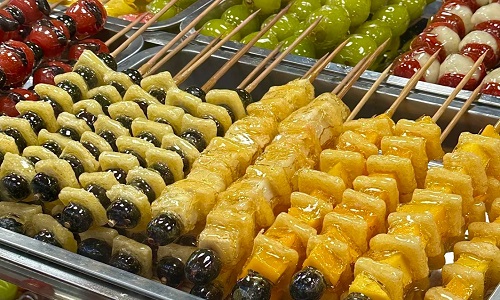
1. Exploring Wangfujing Snack Street – The Heart of Beijing’s Street Food Culture
Wangfujing Snack Street is one of the most famous places to dive into Beijing’s vibrant street food scene. With its bustling stalls and aromatic scents, it offers a real taste of Beijing’s everyday life. The market is a sensory overload where locals and tourists alike gather to indulge in both traditional and experimental foods.
2. Iconic Street Eats to Try
Chuan’r (Grilled Skewers): These skewers, typically made of lamb, chicken, or beef, are coated in a blend of cumin, chili, and garlic, then grilled over an open flame. They’re crispy on the outside, juicy on the inside, and packed with smoky flavors.
Scorpions on a Stick: For the adventurous eater, scorpions are fried and served as an exotic snack. Despite their intimidating appearance, they offer a crunchy texture and a unique flavor.
3. Street Food Culture Beyond Wangfujing
Jianbing: Known as the "Chinese crepe," jianbing is a savory pancake filled with egg, cilantro, scallions, and crispy dough, often drizzled with hoisin sauce. It’s a beloved breakfast item, but you can find it at food stalls throughout the day and night.
Xiao Long Bao: While originally from Shanghai, Beijing has embraced this dumpling filled with piping hot broth and tender pork. The delicate dumplings are a must-try for anyone visiting Beijing.
Noodles in Soup: Whether it's hand-pulled noodles or simple wheat noodles, Beijing’s noodle dishes are both filling and delicious, often served with flavorful broths and unique garnishes like chili oil and soy sauce.
Shandong Dumplings: A variation of dumplings, this region’s influence in Beijing brings a heartier filling of minced pork or beef, with thicker skin and bolder flavors.
Pro Tip: When ordering Beijing’s famous street snacks, don’t forget to ask for "wei là" if you’re not into spicy food. This phrase means "not too spicy," and it’ll help you avoid the fiery heat that’s common in many local dishes. Beijing’s street food is known for its bold, numbing spice, especially in dishes like jiaozi (dumplings) or chuan’r (skewers). If you're sensitive to spice, just remember to ask for "wei là" to keep things at a more comfortable level. Trust us, your taste buds will thank you!
Exploring Beijing’s Wet Markets
While many tourists flock to shopping malls and famous restaurants, the true culinary treasures of Beijing are often found in the city's vibrant wet markets. These bustling hubs of activity are home to local ingredients, fresh produce, and street food stalls where you can experience the city’s food culture in its most authentic form.
.jpg)
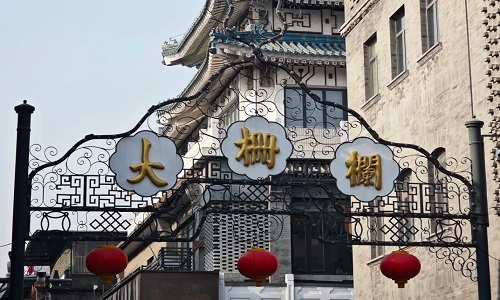
1. Liulichang Market: A Journey Through Beijing’s Culinary Roots
Nestled in one of Beijing’s most historic districts, Liulichang Market is a haven for those wanting to experience the authentic flavors of traditional Beijing cuisine. This market is brimming with fresh ingredients like aromatic spices, dried herbs, and even exotic vegetables—everything you need to cook up a storm of authentic local dishes.
Curious about how to recreate Beijing’s rich culinary history?
Start here!
As you stroll through the market, the vibrant colors and fragrances of the ingredients will inspire you to dive into the city’s deep food culture. Whether you’re a seasoned chef or just a food enthusiast, there’s something magical about exploring the flavors that have been passed down for generations.
2. Dashilan Market: The Heartbeat of Old Beijing’s Street Snacks
Step back in time at Dashilan Market, where the spirit of old Beijing is alive in every bite. This lively marketplace is packed with stalls selling beloved local snacks like bean curd sticks (tian shui yuan), candied hawthorns, and mouth-watering beef jerky. It's more than just a place to shop—it's a feast for the senses.
Looking to truly taste Beijing?
Dashilan is the ultimate spot for food lovers who want to experience the city’s snack culture at its finest. Picture this: walking down narrow alleys, nibbling on freshly made treats, and breathing in the heady mix of savory and sweet aromas that have defined Beijing for centuries.
Pro Tip: Want to experience Beijing like a local? Hit up the wet markets first thing in the morning! Not only will you catch the city waking up, but you’ll also get the freshest seasonal ingredients. Imagine strolling through vibrant stalls, chatting with vendors, and picking up some goodies to cook up your own Beijing-style feast later. It’s like getting a taste of the city’s daily rhythm—and maybe even discovering a new ingredient or two to throw into your cooking. Trust me, it’s an experience you won’t forget!
High Tea: Beijing’s British Influence with a Chinese Twist
While high tea has its origins in the United Kingdom, Beijing has adopted this tradition with its own unique twist. Luxury hotels and upscale tea houses offer a combination of Chinese tea and Western treats, creating a fusion experience that allows visitors to indulge in the best of both worlds.
1. The Peninsula Beijing: High Tea in Timeless Elegance
If you're in Beijing and craving an upscale high tea, The Peninsula Beijing is a must-visit. Located at 8 Jinyu Hutong, Wangfujing, this iconic hotel serves a fine selection of teas paired with indulgent treats like buttery scones, finger sandwiches, and traditional Chinese dim sum.
Why go?
Enjoy a blend of East and West, where you can savor a cup of premium Jasmine tea alongside steamed bao buns and smoked salmon sandwiches. The serene atmosphere and exceptional service make it a perfect stop after shopping in Wangfujing.
Address: 8 Jinyu Hutong, Wangfujing, Beijing
Phone: +86 10 8516 2888
2. The Lobby Lounge at The Ritz-Carlton Beijing: Where Tea Meets Luxury
For a high tea experience that fuses Eastern flavors with Western elegance, head to The Lobby Lounge at The Ritz-Carlton Beijing, located at 1 Jianguomenwai Avenue, Chaoyang District. Here, you can enjoy premium oolong teas alongside decadent pastries and savory bites like steamed buns and roasted duck pancakes.
Why go?
It’s the perfect mix of luxurious decor, refined teas, and mouth-watering treats. Whether you're catching up with friends or enjoying some alone time, the Ritz-Carlton’s intimate setting offers a relaxing retreat from the city buzz.
Address: 1 Jianguomenwai Avenue, Chaoyang District, Beijing
Phone: +86 10 5908 8888
Pro Tip: Make sure to try the oolong tea or jasmine tea, both of which are popular in Beijing. These fragrant teas complement both the savory and sweet aspects of high tea perfectly.
Beijing’s International Culinary Scene: A Global Foodie’s Paradise
As an international capital, Beijing has seen an explosion of world cuisines, attracting top chefs from all over the globe. From high-end Italian dining to authentic Korean barbecue, you can experience global flavors just as much as traditional Chinese dishes.
1. Italian Dining at Ciao: A Slice of Italy in Beijing
Craving a taste of Italy while in Beijing? Head to Ciao, where you’ll find a cozy, rustic atmosphere that instantly transports you to the heart of Rome. The menu? Pure Italian bliss—think wood-fired pizzas, homemade pastas, and a wine list that will make you feel like you’re dining in Tuscany. Whether you're sharing a margherita pizza with friends or savoring a plate of rich fettuccine, Ciao is all about bringing the flavors of Italy to the heart of Beijing.
Feeling fancy? Pair your meal with a glass of Italian wine, and enjoy a dinner that’s as comforting as it is delicious. This isn’t just a meal—it’s an Italian getaway, right in the middle of Beijing.
Address: 1/F, The China World Hotel, 1 Jianguomenwai Avenue, Chaoyang District, Beijing
Phone: +86 10 6505 2277
2. Korean BBQ at Gogung: Sizzle, Spice, and Everything Nice
If you’re in the mood for something a little more interactive, Gogung Korean BBQ in Wangfujing is where the action’s at. Picture this: sizzling platters of perfectly marinated meats, colorful veggies, and the irresistible aroma of bulgogi and kalbi cooking right in front of you. Paired with fresh kimchi, savory banchan (side dishes), and a cold bottle of soju, it’s the ultimate feast for any BBQ lover.
Why go? Because there’s nothing like grilling your own meat at the table, sharing it with friends, and savoring those bold Korean flavors. Plus, Gogung’s vibe is just as lively as the food—making it perfect for a fun night out. Who says you can’t enjoy a little K-food while in China?
Address: 2F, Wangfujing Street, Dongcheng District, Beijing
Phone: +86 10 6512 9988
Pro Tip: If you’re in the mood for a quick snack, head to Sanlitun for a vibrant mix of international cuisines, including Korean, Japanese, and Mediterranean street food.
Foodie Events and Festivals: Join the Fun in Beijing
Beijing hosts a variety of food-related events throughout the year, bringing together local chefs, international food experts, and food lovers from around the world.
1. Beijing Food Festival: A Flavor Explosion You Can’t Miss
The Beijing Food Festival is a food lover’s dream. Imagine this: bustling food stalls with mouth-watering street eats, plus upscale restaurants offering gourmet bites—all in one place. You’ll find yourself sampling everything from sizzling skewers to delicate dim sum while chefs show off their cooking skills in live demos. Add in some live music, and you’ve got a celebration of Beijing’s food scene that you won’t forget.
If you love food (and who doesn’t?), this festival is your chance to taste the very best of the city, all in one place. Get ready for a full-on, flavor-packed experience!
2. Chinese New Year Feast: Celebrate the New Year with a Feast
Want to experience the true flavor of Chinese New Year in Beijing? Many top restaurants roll out special menus featuring traditional dishes that bring good fortune for the year ahead. From dumplings for wealth to fish for abundance, these festive meals are packed with meaning (and deliciousness!).
It’s not just about eating—it's about diving into a celebration of culture and tradition, one bite at a time. Whether you’re in Beijing for the holiday or just craving something special, the Chinese New Year Feast is the ultimate way to indulge in local customs.
Seasonal Dining in Beijing: What to Eat by Season
.jpg)
.jpg)
1. Beijing in Spring – Light, Fresh Dishes
Spring is a time when Beijing’s markets are brimming with fresh, seasonal produce. Light dishes such as spring rolls, stir-fried vegetables, and crab meat take center stage.
Spring Vegetable Dumplings: Filled with fresh, seasonal vegetables such as bok choy, spinach, and mushrooms, these dumplings are a refreshing, healthy choice.
Cold Noodles: As temperatures rise, cold noodle dishes like liangpi (cold wheat noodles) are a favorite among locals.
2. Beijing in Winter – Hearty and Warming Dishes
Winter in Beijing calls for heartier, warming meals that offer comfort during the cold months. This is when hotpot, stews, and lamb dishes reign supreme.
Lamb Stew with Chinese Herbs: A hearty dish that’s perfect for winter, this dish is cooked with warming herbs like angelica root, ginseng, and goji berries to nourish the body and warm the soul.
Hot Pot: As the city’s temperatures drop, hot pot becomes a popular choice, offering diners an interactive and warming meal experience.
3. Hot Pot & Lamb Stew: A Warming Culinary Experience for All Seasons
While Sichuan is often the first place people think of when it comes to hot pot, Beijing’s version offers its own unique twist. The Beijing-style hot pot is typically served with a mild broth base, allowing the focus to be on the fresh ingredients and the condiments.
Hot Pot Ritual: In Beijing, hot pot is more than just a meal; it's a social event. Families and friends gather around the simmering broth, dipping fresh meats, vegetables, and noodles into the pot to cook them right before their eyes.
Beijing’s Lamb Hot Pot: Beijing’s lamb hot pot is a true local delicacy, especially in winter. The broth is light, with Chinese herbs like goji berries and jujube to enrich the flavors, making it perfect for combating the cold.
4. Best Hot Pot Spots
Haidilao: Known for its outstanding service and interactive dining experience, Haidilao offers a variety of broths, including the traditional lamb soup base, and an array of dipping sauces.
Haidilao - Sanlitun
Address: 1F, Sanlitun Village, Chaoyang District, Beijing
Phone: +86 10 6416 5120
Haidilao - Wangfujing
Address: 2F, Beijing APM Mall, Wangfujing, Dongcheng District, Beijing
Phone: +86 10 6527 0197
Haidilao - Xidan
Address: 1F, Xidan Joy City, Xidan North Street, Xicheng District, Beijing
Address: 1F, Xidan Joy City, Xidan North Street, Xicheng District, Beijing
Donglaishun: A Beijing institution, Donglaishun specializes in lamb hot pot and has been serving the dish since 1903. The restaurant’s heritage is reflected in its traditional presentation and flavors.
Donglaishun - Shuaifuyuan Hutong
Address: 17 Shuaifuyuan Hutong, Xicheng District, Beijing
Phone: +86 10 6601 9294
Donglaishun - Xidan
Address: 4F, Xidan Shopping Mall, Xidan North Street, Xicheng District, Beijing
Phone: +86 10 6603 6611
Donglaishun - Wangfujing
Address: 2F, Beijing APM Mall, Wangfujing, Dongcheng District, Beijing
Phone: +86 10 6512 1966
5. More Than Just Hot Pot – Other Stews to Explore
Beef Stew with Chinese Herbs: A rich stew made with slow-cooked beef, Chinese medicinal herbs, and a soy-based broth. This dish is not just flavorful but also believed to have health benefits, making it popular during the colder months.
Teahouses and Traditional Dining: Sip, Savor, and Reflect
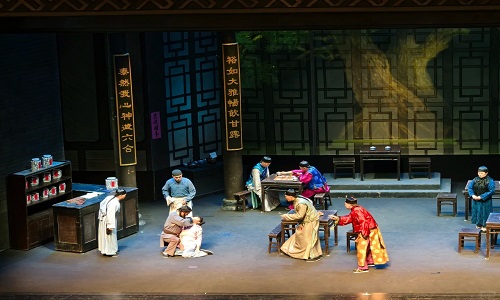
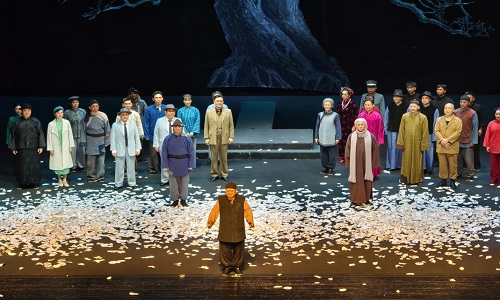
1. The Tea Culture of Beijing – A Tradition Steeped in History
Tea has played a central role in Chinese culture for centuries, and Beijing is home to some of the country’s most revered teahouses. These tranquil spots offer a break from the city’s fast-paced life, where tea lovers can explore different varieties and participate in a traditional tea ceremony.
Types of Tea: From the delicate, floral aroma of jasmine tea to the earthy richness of pu-erh, Beijing’s teahouses cater to a wide array of tastes. Oolong tea and green tea are also popular choices among locals.
The Tea Ceremony: Many teahouses in Beijing offer a chance to experience the traditional Chinese tea ceremony, where every step, from the warming of the pot to the pouring of the tea, is done with deliberate care and precision.
2. Recommended Teahouses
Lao She Teahouse: Immerse Yourself in Beijing’s Cultural Heritage
If you’re looking for an authentic cultural experience, Lao She Teahouse is a must-visit. Situated in the heart of Beijing, this cultural landmark blends the art of tea-drinking with traditional performances like Peking opera, storytelling, and cross-talk. It’s the perfect place to sip on a fragrant pot of tea while enjoying a taste of Beijing’s rich cultural traditions.
Whether you’re a tea lover or simply seeking an evening of entertainment, Lao She Teahouse offers an immersive experience you won’t forget. Relax, enjoy the atmosphere, and discover why this spot is a favorite among both locals and tourists alike.
Address: 3 Qianmen Dong Street, Dongcheng District, Beijing
Phone: +86 10 6311 5800
Cha Yi Xuan: A Tea Lover’s Sanctuary
For those with a refined palate, Cha Yi Xuan is a haven for high-quality, rare teas. Located in a peaceful setting, this intimate teahouse specializes in offering a deep dive into the art of tea brewing. Whether you're an expert or a novice, their knowledgeable staff will guide you through the tea-tasting experience, introducing you to some of the finest teas from across China.
Looking for a quieter, more personal tea session? Cha Yi Xuan is where you can savor every sip and truly appreciate the subtleties of premium tea. It’s an ideal spot to escape the city buzz and unwind with a cup of the finest brew.
Address: 3/F, Beijing Hotel, 33 East Chang’an Avenue, Dongcheng District, Beijing
Phone: +86 10 6513 1666
Modern Dining and Fusion Cuisine: A Glimpse into Beijing’s Culinary Future
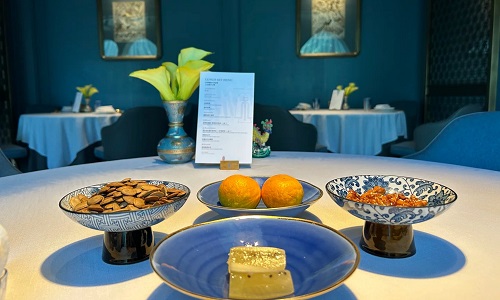

1. The Rise of Fusion Dining in Beijing
In recent years, Beijing has embraced fusion cuisine, where traditional Chinese ingredients meet international flavors and techniques. This trend is reflected in many upscale restaurants that reinterpret classic Chinese dishes, offering diners an innovative, global take on Beijing’s culinary traditions.
2. Beijing Meets the World
Many restaurants in Beijing combine Chinese culinary techniques with international influences. For example, some chefs are incorporating French methods to elevate classic Beijing dishes like Peking Duck, while others blend Sichuan heat with Mediterranean flavors.
3. Michelin Star Restaurants
Michelin-starred dining is a burgeoning scene in Beijing, with several restaurants earning accolades for their exceptional offerings that blend traditional ingredients with contemporary techniques.
Fusion Dining Highlights
1. Mio at Four Seasons: Where Italian Elegance Meets Chinese Flavors
For an unforgettable dining experience, Mio at Four Seasons brings a Michelin-starred twist to both Italian and Chinese cuisines. The restaurant seamlessly blends modern Italian techniques with traditional Chinese ingredients, creating dishes that are both familiar and innovative. From handmade pastas to delicately crafted seafood, every plate tells a story of culinary fusion.
Expect a dining experience that celebrates the best of both worlds—where rich Chinese flavors meet the sophistication of Italian cooking. Whether you're a foodie looking for new flavors or simply someone who appreciates fine dining, Mio offers a luxurious yet approachable atmosphere that makes every meal feel special.
Address: Four Seasons Hotel Beijing, 48 Liangmaqiao Road, Chaoyang District, Beijing
Phone: +86 10 5695 8888
2. Duck de Chine: Peking Duck Reimagined
Duck de Chine is not your traditional Peking Duck spot—it’s a contemporary reimagining of Beijing’s iconic dish. This high-end restaurant elevates the classic duck with global flavors, offering a modern and chic setting to savor each bite. From the crispy skin to the tender meat, every aspect of the duck is served to perfection, enhanced by unique sauces and side dishes that infuse international flavors into a rich Chinese tradition.
Looking for something beyond the ordinary? Duck de Chine delivers not just a meal, but an experience, blending the familiar with the innovative in an elegant atmosphere. It’s the perfect place for a memorable night out that combines luxury with tradition.
Address: 1949 – The Hidden City, 8 Gongti North Road, Chaoyang District, Beijing
Phone: +86 10 6417 1022
Beijing’s Hidden Culinary Gems: Off the Beaten Path
1. Exploring the Hutongs for Authentic Dining
While Beijing’s landmarks may attract the most attention, its hutongs (narrow alleys) are where the city’s true culinary soul can be found. Hidden within these ancient alleyways are family-run eateries and local markets that serve some of the most authentic dishes in the city.
2. Hidden Teahouses and Small Bistros
Jingzhen Bistrot: A Cozy Tavern for Traditional Beijing Flavors and Fine Drinks
Tucked away in a charming traditional courtyard, Jingzhen Bistrot is a cozy tavern that invites you to unwind with a glass of fine wine or a cold beer while savoring authentic Beijing dishes. This hidden gem offers more than just hearty, comforting meals—it's a place where you can enjoy a laid-back atmosphere, perfect for sampling traditional dishes paired with a carefully curated selection of drinks.
The tavern specializes in home-style Beijing fare, from zhajiangmian (fried sauce noodles) to hand-crafted dumplings, served alongside a variety of wines, craft beers, and locally sourced spirits. Whether you're in the mood for a classic drink or a special tea, Jingzhen Bistrot creates a welcoming space to enjoy both great food and good company.
Looking for a spot to relax with friends, enjoy some drinks, and taste local flavors? Jingzhen Bistrot offers a unique and intimate tavern experience in the heart of Beijing.
Address: 4 Yangfang Hutong, Xicheng District, Beijing
Phone: +86 10 8404 0930
Qiankun Tea House: A Peaceful Retreat for Tea Lovers
Tucked away in one of Beijing’s charming hutongs, Qiankun Tea House is a peaceful escape from the city's chaos. Known for its serene atmosphere, this unassuming tea house specializes in a curated selection of premium teas, including rare and high-quality varieties. Whether you’re a tea connoisseur or just looking to relax, this tea house offers an authentic, quiet space to enjoy expertly brewed tea.
In the mood for something more than just a cup of tea? Qiankun offers a perfect place to escape the noise and dive deep into the world of fine teas—every sip here is a moment of calm.
Address: 1 Qiankun Hutong, Dongcheng District, Beijing
Phone: +86 10 6400 2288
Vegetarian and Vegan Dining: A Flourishing Scene in Beijing
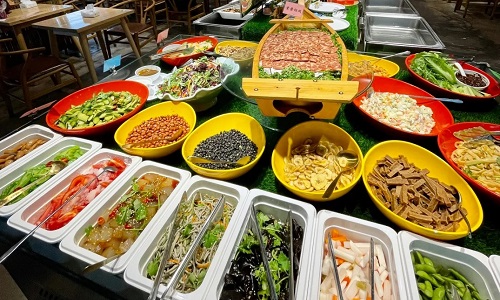
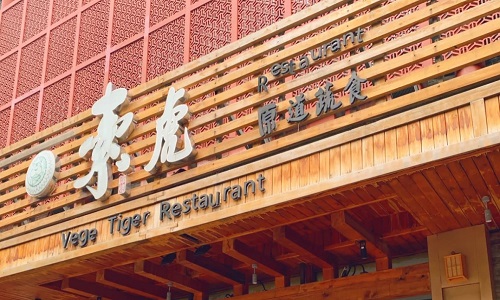
1. The Growing Trend of Plant-Based Dining
Beijing’s food scene has evolved to accommodate a growing demand for vegetarian and vegan dining. Many restaurants now offer plant-based alternatives, and some focus entirely on vegetarian dishes, making use of tofu, seitan, and fresh vegetables to create flavorful meals.
Pure Lotus: A Gourmet Vegetarian Experience in the Heart of Beijing
For those seeking a sophisticated and plant-based dining experience, Pure Lotus is the place to be. This high-end vegetarian restaurant takes traditional Beijing dishes and reimagines them with a vegetarian twist. Expect to find mock meats, including their signature vegetarian Peking Duck, crafted with the same care and attention to detail as the original.
Pure Lotus offers a serene and elegant atmosphere, making it perfect for those looking to indulge in innovative, guilt-free dining without compromising on flavor. Whether you're a vegetarian or simply curious, Pure Lotus serves up a truly unique culinary journey that celebrates the richness of Beijing's flavors in a plant-based form.
Address: 1/F, 19 Dongzhimen South Street, Chaoyang District, Beijing
Phone: +86 10 6415 3399
Vegetarian Family: Cozy Comfort in Every Bite
Looking for a homestyle vegetarian meal? Vegetarian Family is a cozy spot that specializes in comforting, home-style vegetarian dishes. From stir-fried lotus root to veggie dumplings and mock meat specialties, this restaurant offers a warm, inviting atmosphere perfect for a casual meal with family or friends.
The flavors here are simple, fresh, and hearty, showcasing the best of plant-based cuisine in a way that feels familiar and comforting. Whether you're craving a light bite or a full meal, Vegetarian Family offers delicious, wholesome food that brings out the natural taste of vegetables in every dish.
Address: 2/F, 88 Nanchizi Street, Dongcheng District, Beijing
Phone: +86 10 6526 5555
2. Vegetarian and Plant-Based Dining: A Rising Trend in Beijing
With more people adopting plant-based lifestyles, Beijing has seen an explosion in vegetarian and vegan dining options. Restaurants specializing in plant-based meals are opening up all over the city, with menus that explore creative takes on traditional Chinese flavors using plant-based ingredients.
Vegan Hutong: A Plant-Based Escape in the Heart of Beijing
Tucked away in the charming hutongs of Beijing, Vegan Hutong is the perfect place for those seeking a plant-based twist on traditional Beijing cuisine. Here, you can enjoy organic, vegan versions of classic dishes like vegan Peking Duck, tofu hotpot, and vegetable dumplings—all crafted with fresh, locally sourced ingredients.
Whether you're a dedicated vegan or just curious about plant-based dining, this cozy spot combines the vibrant flavors of Beijing with sustainable, cruelty-free ingredients. The intimate hutong setting makes it a truly special dining experience, letting you explore Beijing’s flavors while staying true to your plant-based lifestyle.
Address: 16 Zhangwang Hutong, Dongcheng District, Beijing
Phone: +86 10 8404 2381
Vege Tiger: A Vegan Culinary Adventure in Beijing
For a delicious, plant-based take on some of China’s most iconic dishes, head to Vege Tiger. One of the most popular vegan spots in Beijing, Vege Tiger specializes in plant-based versions of beloved dishes like Kung Pao Tofu, Vegan Mapo Tofu, and Mongolian-style veggie stir fry.
With its bold flavors and satisfying dishes, this is the perfect spot for anyone craving the tastes of traditional Chinese cuisine, but with a vegan twist. The atmosphere is casual and welcoming, making it a great place to enjoy a hearty meal with friends or family while sticking to your plant-based lifestyle.
Address: 1/F, 2B Sanlitun North, Chaoyang District, Beijing
Phone: +86 10 6416 3102
3. The Growing Popularity of Plant-Based Street Food
Even Beijing’s famous street food vendors are jumping on the plant-based trend. In recent years, vegetarian and vegan options have begun to appear at local snack stalls.
Vegan Jianbing: A popular twist on the classic Chinese crepe, some food stalls now offer vegan-friendly jianbing, filled with plant-based ingredients such as vegan egg, tofu, and soy sauce.
Vegan Baozi (Steamed Buns): Vendors in local markets are offering vegetarian baozi filled with mushrooms, tofu, and mixed vegetables, perfect for a healthy snack on the go.
Pro Tip: If you're looking for vegetarian-friendly street food, make sure to ask for wèihú (vegetarian) when ordering. Many stalls offer plant-based versions of their popular dishes.
A Melting Pot of Cuisines
As the capital of China, Beijing is home to a melting pot of international influences. The city’s dining scene has embraced a variety of world cuisines, from French fine dining to authentic Italian, Japanese, and even Middle Eastern flavors. You can taste the world without leaving Beijing, and many international chefs have come to call the city home, creating a diverse and exciting culinary landscape.
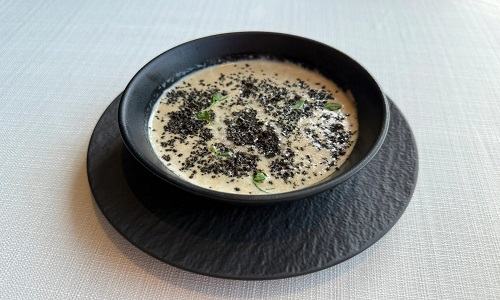
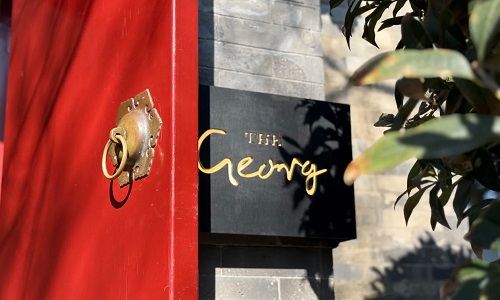
1. French Cuisine in Beijing: Maison Boulud—Where Paris Meets Beijing
For a true culinary journey that blends French elegance with local Chinese ingredients, head to Maison Boulud, the creation of world-renowned French chef Daniel Boulud. Here, traditional French techniques come alive in dishes like duck confit with Chinese spices and foie gras with black vinegar, offering an unforgettable fusion of two rich culinary cultures.
Whether you're a fan of classic French dishes or eager to try a creative twist on old favorites, Maison Boulud promises an elevated dining experience that combines the best of both worlds. The ambiance is sophisticated yet welcoming, making it an ideal spot for a special night out or an indulgent lunch.
Address: 3/F, Beijing Hotel, 33 East Chang'an Avenue, Dongcheng District, Beijing
Phone: +86 10 6559 6616
2. Middle Eastern Flavors in the Heart of Beijing: Al-Madina
Craving bold, aromatic flavors from the Middle East? Look no further than Al-Madina in Sanlitun, where the heart of the Middle East meets the vibrant streets of Beijing. Here, you’ll find a menu packed with mouth-watering dishes like succulent kebabs, creamy hummus, crispy falafel, and fragrant stews that will transport your taste buds straight to the Mediterranean.
The restaurant’s cozy and authentic atmosphere adds to the charm, making it a perfect spot for casual dining or gathering with friends. Whether you’re new to Middle Eastern cuisine or a long-time fan, Al-Madina serves up an unforgettable feast that will leave you coming back for more.
Address: 1/F, 10 Sanlitun Road, Chaoyang District, Beijing
Phone: +86 10 6415 6169
Beijing’s High-End Dining Scene
While street food and traditional dishes dominate much of the Beijing dining experience, the city also boasts a thriving fine-dining scene. With Michelin-starred restaurants, five-star hotels, and world-renowned chefs, Beijing offers an elevated culinary experience that matches its status as a global capital.
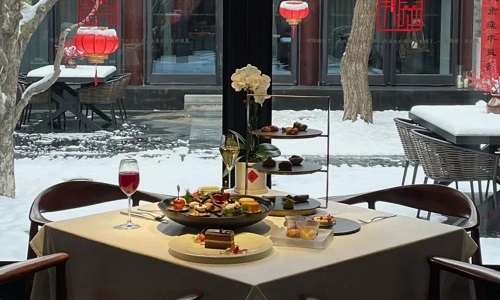
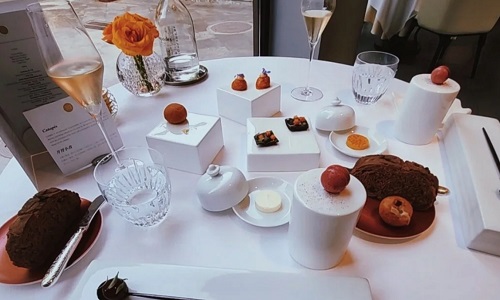
1. Jing Yaa Tang: Peking Duck and Luxury Dining at Its Best
For an upscale dining experience in Beijing, Jing Yaa Tang at The Opposite House is the place to be. Specializing in the iconic Peking Duck, this luxurious spot elevates the classic dish with exceptional flavors and expert craftsmanship. But it’s not just the duck that’s worth savoring—Jing Yaa Tang also offers a range of high-end Chinese delicacies, prepared with the finest ingredients and utmost precision.
Located inside one of Beijing’s most stylish hotels, the ambiance at Jing Yaa Tang is a perfect blend of modern design and traditional Chinese elements, making it an ideal place for both casual and special occasions. Whether you're here for the Peking Duck or the exceptional service, this restaurant promises a dining experience that’s truly memorable.
Address: The Opposite House, 11 Sanlitun Road, Chaoyang District, Beijing
Phone: +86 10 6410 5240
2. TRB Forbidden City: Where French Elegance Meets Chinese Tradition
Set against the backdrop of the Forbidden City, TRB Forbidden City offers a dining experience that combines the sophistication of French cuisine with the rich flavors of Chinese ingredients. This unique fusion of French culinary artistry and Chinese tradition creates a truly stunning gastronomic experience.
From exquisite French-inspired dishes to carefully curated local flavors, the menu at TRB Forbidden City is a culinary journey like no other. Add in the breathtaking views of the Forbidden City, and you’ve got a dining experience that’s not just about the food, but about immersing yourself in the beauty of Beijing’s history. Whether it’s a romantic dinner or a special celebration, this restaurant offers the perfect setting.
Address: 4/F, 2 Wangfujing Street, Dongcheng District, Beijing
Phone: +86 10 6526 2888
Food for the Soul: Beijing’s Traditional Banquets and Special Occasions
1. The Art of Beijing Banquets
In Beijing, food is often tied to ceremonial occasions, and the city has a rich tradition of hosting lavish banquets for special events, weddings, and state occasions. The food at these banquets is a reflection of the city’s status and heritage, often featuring elaborate dishes that demonstrate the skill and artistry of the chefs.
Ming Dynasty Banquet: A truly unique experience, where diners can indulge in traditional dishes served in a historical, banquet-style setting. These banquets often feature intricate cold dishes, a wide range of meat and seafood, and desserts that are as much about the visual presentation as the taste.
Chinese New Year Feasts: During Chinese New Year, many restaurants and families will serve a banquet-style feast filled with auspicious dishes like whole fish (for prosperity), dumplings (symbolizing wealth), and sticky rice cakes (for good fortune).
2. The “Eight Great Cuisines” of China
Beijing dining doesn’t just represent the city’s own culinary history, but also serves as an intersection for the many regional cuisines of China. The Eight Great Cuisines of China are celebrated across the city’s restaurants, with each region’s specialties being put forth in their most authentic forms.
Shandong Cuisine: Famous for its fresh ingredients and simple, clean flavors, Shandong cuisine is widely available in Beijing, with dishes like Dezhou braised chicken and seafood stews served at many local spots.
Sichuan Cuisine: Known for its bold, spicy flavors, Sichuan food is easy to find in Beijing. Restaurants like Shu Jiu Xiang and Haidilao Hot Pot provide an authentic taste of this fiery, flavorful cuisine.
Cantonese Cuisine: Dim sum is a favorite in Beijing, with restaurants like The Imperial Cuisine offering a wide variety of bite-sized dishes, such as dumplings, buns, and other Cantonese specialties.
Beijing’s Coffee Culture: Sipping Your Way Through the City
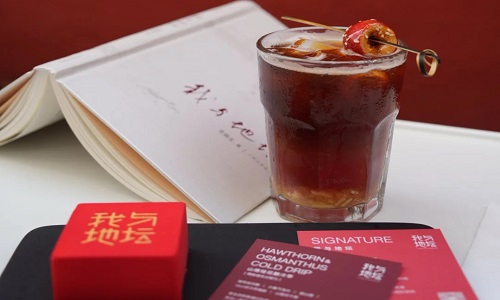
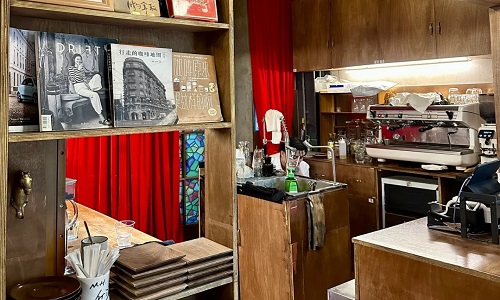
1. The Rise of Coffee Shops in Beijing
Beijing has quickly become a hub for coffee culture in China, with the rise of specialty coffee shops serving high-quality brews from around the world. From local roasters to international coffee chains, the city offers an excellent selection of coffee options for aficionados.
Siphon Coffee: This brewing method, which uses a vacuum siphon to brew coffee, has gained popularity in Beijing. Some cafes, like Soloist Coffee and Cafe de la Poste, specialize in this method, offering a unique and rich coffee experience.
Local Roasters: Beijing’s coffee scene has been growing with local roasters like Maan Coffee and Café 100. These spots focus on high-quality, single-origin beans, often sourced from small, sustainable farms.
2. The Coffee and Dessert Pairing
Beijing’s coffee shops are not just about coffee; many offer a variety of desserts that pair perfectly with your cup. Think about a matcha-flavored cake, classic tiramisu, or pistachio macaroons—all freshly baked and served alongside your favorite brew.
The Coffee Commune: Where European Coffee Meets Local Flavors
For coffee lovers and pastry enthusiasts alike, The Coffee Commune is a must-visit spot in Beijing. Known for its expertly brewed coffee and irresistible pastries, this café brings together European coffee culture with local Chinese influences. Imagine sipping on a rich espresso paired with delicate Chinese tea cakes, a perfect blend of the familiar and the exotic.
Whether you're in the mood for a classic cappuccino or something with a local twist, The Coffee Commune has something for every taste. With a relaxed atmosphere and a focus on high-quality ingredients, it’s the perfect place to unwind, enjoy a bite, and indulge in some of the best coffee in the city.
Address: 1/F, 19 Dongzhimen North Street, Dongcheng District, Beijing
Phone: +86 10 8407 3266
Sustainable Dining: How Beijing is Shaping Its Future
1. The Push for Sustainable Food Practices
With an increasing global focus on sustainability, Beijing’s restaurants are beginning to adopt eco-friendly practices, from reducing food waste to sourcing local and organic ingredients. The city is seeing a rise in sustainable dining options that prioritize the environment, health, and community well-being.
Farm-to-Table Restaurants: Many restaurants in Beijing are working with local farmers and suppliers to bring fresh, sustainable ingredients directly to the table. This approach reduces carbon footprints and supports local agriculture.
Zero-Waste Dining: Some high-end restaurants are experimenting with zero-waste dining practices, where ingredients are used in every part of the dish to reduce food waste, and organic waste is composted or repurposed for other uses.
2. Green Restaurants in Beijing
The Green Table: Sustainable Dining with a Focus on Local, Organic Ingredients
At The Green Table, sustainability is at the heart of everything. This eco-conscious restaurant specializes in organic, locally-sourced dishes, ensuring that every meal not only tastes fresh but also supports sustainable farming practices. From seasonal vegetables to free-range meats, The Green Table emphasizes high-quality ingredients that are both good for you and the planet.
Known for its eco-friendly practices, such as zero-waste initiatives and recyclable packaging, this restaurant offers a dining experience that feels as good as it tastes. Whether you're a committed environmentalist or simply appreciate delicious, sustainable food, The Green Table provides a unique dining experience that leaves a positive impact on both your palate and the environment.
Address: 10 Sanlitun Road, Chaoyang District, Beijing
Phone: +86 10 6416 7077
Bamboo Garden: Zero-Waste, Plant-Based Dining with a Green Heart
Located near the Olympic Park, Bamboo Garden takes eco-friendly dining to the next level. This zero-waste restaurant specializes in plant-based cuisine and is committed to reducing its environmental footprint. With a menu focused on organic produce and a strong partnership with local farmers, Bamboo Garden ensures that every dish is both nourishing and environmentally conscious.
From creative veggie-based stir-fries to hearty plant-based stews, every bite at Bamboo Garden reflects a deep respect for nature and sustainability. If you’re looking to enjoy delicious food while doing your part for the planet, this is the place to be.
Address: 1/F, 6 Guanghua Road, Chaoyang District, Beijing
Phone: +86 10 6488 1010
Beijing’s Nightlife Dining: Eating Out After Dark
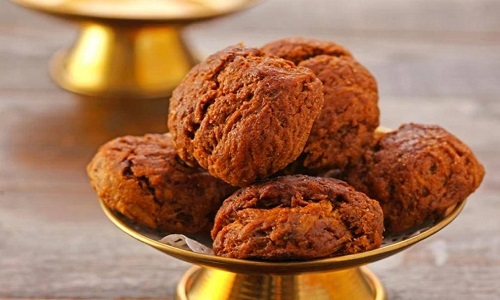
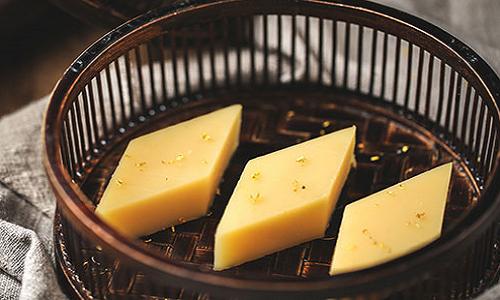
1. Late-Night Eats in Beijing
Beijing’s culinary scene doesn’t sleep. For those who love dining after dark, the city offers an exciting array of late-night eateries that cater to night owls. From street vendors to 24-hour restaurants, there’s something for everyone at any hour of the night.
Night Markets: Places like Donghuamen Night Market offer a variety of street food for late-night cravings, including skewers, dumplings, and even sweet treats.
24-Hour Hot Pot: Restaurants like Haidilao and Donglaishun offer 24-hour hot pot dining, allowing you to indulge in Beijing’s favorite comfort food at any time of day or night.
2. Late-Night Desserts
For those with a sweet tooth, Beijing’s dessert scene doesn’t end when the sun goes down. There are plenty of dessert spots that remain open late, offering classic Chinese treats and Western-style desserts to satisfy any craving.
Tianjin Street: A popular area for dessert lovers, where you'll find stalls selling everything from steamed buns with sweet fillings to savory pastries and bubble tea.
A Sweet Conclusion: Desserts and Snacks to End Your Meal
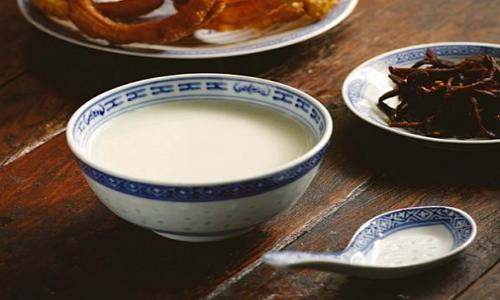
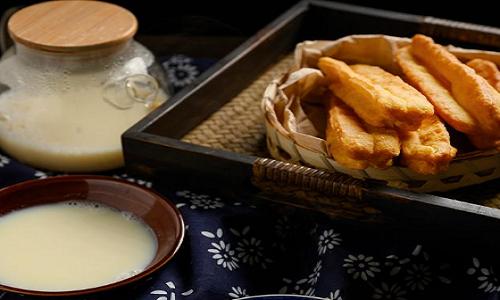
1. Traditional Chinese Desserts: A Sweet Ending to Your Meal
Tangyuan (Sweet Rice Balls): These glutinous rice balls, typically filled with sweet black sesame paste, are often served in a sweet soup and are especially popular during festivals like the Lantern Festival.
Douzhi (Mung Bean Soup): A local Beijing specialty, this savory-sweet soup made from mung beans is often enjoyed with pickled vegetables for contrast.
Pro Tip: Try "shaobing" (a traditional Beijing sesame pastry) as a street snack, or indulge in a bowl of "hongtang" (red sugar soup) for a true taste of Beijing’s dessert culture.
Conclusion: A Multi-Dimensional Culinary Adventure Awaits in Beijing
Beijing’s food scene is a dynamic reflection of the city’s history, culture, and innovation. From the royal Peking Duck to street-side snacks and high-end fusion dining, the city offers something for every palate and every type of foodie. Whether you’re exploring ancient culinary traditions or embracing the future of gastronomy, Beijing invites you to discover its layers, bite by bite. So grab your chopsticks, embark on this culinary journey, and taste the authentic, evolving flavors of Beijing.
Top Dining Experiences in Beijing Recommended by Your Way Holiday
We design private and Tailor-made Beijing Tours customized to your style of travel at affordable local prices. We will provide a private & spacious car and a local professional tour guide with over 5 years guiding experience only work for you or your group. Transport, ticket, and dining (We find the most authentic dishes popular with locals) all we will arrange for you according your requirements. Please check our most popular tours below:
Are the above sample tour programs not suitable for you? Dont worry, our Beijing tours can be tailor-made based on your requirements and budget to create unique Beijing experiences that allow you to interact with the local people and culture. We are Beijing travel experts who know what your guidebook and foreign agencies don't. Our enthusiastic tour expert will promptly reply you in details within 24 hours.
Prev: Top Beijing Festivals and Events You Can’t Miss Throughout the Year
Next: Can Americans Travel to China? Everything You Need to Know
Wechat: Chinaprivatetour
24 Hours Hotline:
+86 137-3541-1378
* Authentic Experiences: Genuine local experiences that immerse you in the true essence of Beijing and beyond.
* Safety First: Highest safety standards with secure activities and reliable transportation.
* Customizable Tours: Flexible itineraries tailored to your interests and needs.
* Local Expertise: In-depth knowledge of Beijing and China, offering exclusive insights.
* Professional Guides: Licensed bilingual guides with over 5 years of experience.
* Comfortable Travel: Experienced drivers and well-maintained vehicles for a smooth journey.
* Sustainable Tourism: Commitment to responsible tourism and supporting local communities.
* Customer-Focused: Personalized service and continuous improvement based on your feedback.
* Free Cancellation: Cancel up to 24 hours before travel for flexibility and peace of mind.
* 24/7 Support: Round-the-clock assistance for any questions or help needed.
1 to 1 tailor-made service from our professional travel advisors for the most sophisticated
Constantly excellent reviews for attraction, hotel and service Competitive price
Local experts provide quality tours Best selected knowledgeable local guides Authentic local restaurants
7*24 hours available to create you a worry-free tour. No Hidden Fees and absolutely no pressure to buy. Secured









Copyright © 2017 Chinabeijingprivatetour.com All rights reserved. 浙ICP备18056007号-2